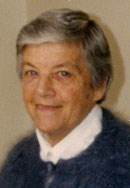Grealy, Sr. Josephine
 On Monday, 3 January 2011, Sister Josephine Grealy slipped away to heaven without a fuss. Her sudden passing during her sleep was a great shock for the community at the Motherhouse of the Medical Missionaries of Mary, and for her loving sisters and brothers. During her long years of missionary service she certainly experienced the ‘extraordinary adventure’ that anyone joining the Medical Missionaries of Mary can expect.
On Monday, 3 January 2011, Sister Josephine Grealy slipped away to heaven without a fuss. Her sudden passing during her sleep was a great shock for the community at the Motherhouse of the Medical Missionaries of Mary, and for her loving sisters and brothers. During her long years of missionary service she certainly experienced the ‘extraordinary adventure’ that anyone joining the Medical Missionaries of Mary can expect.
While she preferred to remain in the background, her practical leadership and proficiency left a legacy wherever she worked.
She had just completed the manuscript of her memoirs. Born in Kiltimagh, Co. Mayo, she was the fifth child of a family of six. She remembered details of the train journey that took her to Dublin en route to Drogheda to join MMM. “I do remember my dear mother saying as I was leaving: ‘Remember if you are not happy, you always have a home to come to.”‘ She began her general nursing training in Drogheda and completed it at Jervis Street in Dublin. Later she trained in midwifery in Drogheda.
Her memoirs are full of anecdotes. In Nigeria, she recalled: “We treated patients with snake bites and rabies. I remember one patient, a six foot tall, strongly build man who was brought in, already in the latter stages of rabies. He ran wildly around the compound and we had to get some men to catch him and hold him down while I gave him an injection to knock him out. In the process he left the track of his teeth in my arm, but happily, he didn’t break the skin. The result was I had to get the anti-rabies vaccine, which in those days was 4 cc given intramuscularly twice weekly for six weeks. The Sister who gave them to me tried to convince me that they hurt her more than they hurt me, but I could not quite believe it.”
In Tanzania she was the director of nursing at nDareda Hospital when suddenly at 8.49 a.m., on Ascension Thursday in 1964, there was a loud rumbling noise and everything – walls, ground – began to move and shake over and back. ‘Even the bell on the wall began to ring. You would have thought the ground was about to split wide open… In the labour ward there was a woman in labour who crawled under the bed. Later that morning she delivered a beautiful baby girl whom she called Tetameka, the Swahili word for earthquake.’
In 1978 she was transferred from Tanzania to Uganda and recounts many incidents from the war days leading up to the overthrow of Idi Amin, when the army of Tanzania was sent into Uganda. ‘During the daylight hours planes were flying around and spitting (that’s the only way to describe it) gunfire. That means we had to be very watchful and be ready to dive for cover if we saw or heard them. The sick and the injured of the army sometimes attended and all of them knew Kiswahili, so those of us who knew the language could converse with them.’
She met army personnel again when she was assigned to Liberia in 1991. She recounted the background:
‘In 1990 there was a bloody civil war led by Charles Taylor. This was the Liberia to which I arrived in January 1991. At that time a cease-fire had been declared but it was very shaky. Every day we heard of more and more atrocities.’ The walls in the Sisters’ house were full of bullet holes. ‘In spite of everything I came to know and love the patients, many of whom were there for years. When one really knew these poor people who had so little and suffered so much, and yet were so happy in themselves, one not only admired but also loved them. Many were very incapacitated, some were blind, others missing fingers or toes, legs or a foot.’
In Liberia she had malaria, an illness she knew well from her days in Nigeria, but she also developed hepatitis, and was just recovered from that when she fell and fractured her femur. That meant returning to Drogheda as a stretcher case. On 19 December 1992 at the airport in Monrovia ‘the heavens opened and poured down torrential rain, so heavy that no one could move. That was my farewell to this land which had become dear to me. I thought it wept with me and for me. It was also the end of the overseas missionary era for me. I returned to my first love, the land of my birth, and after a long recovery I was assigned to the home mission in Drogheda.’
See All Obituaries
